One of a Kind
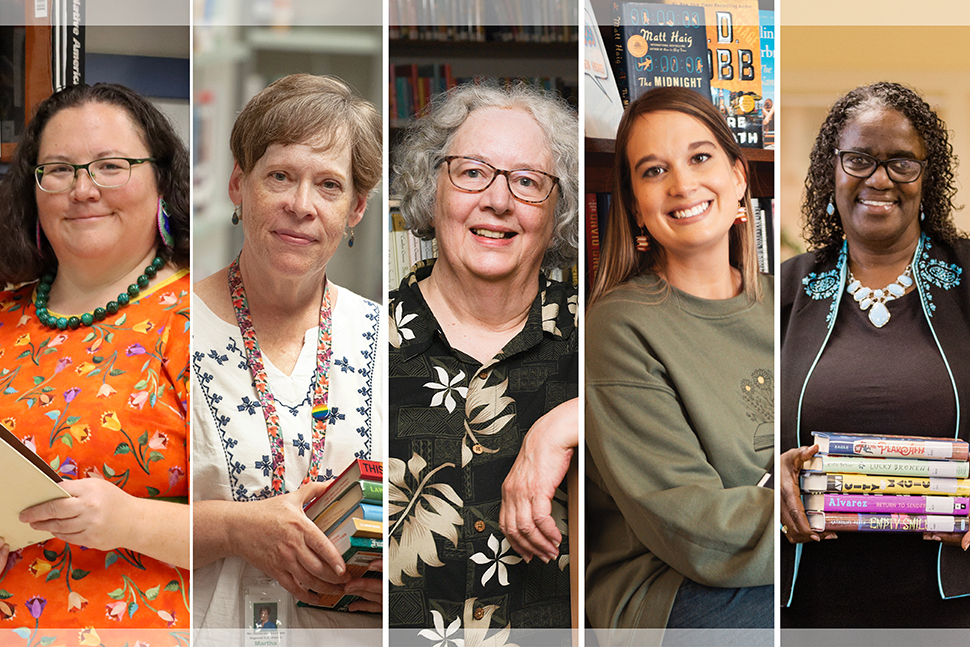
Libraries of all sizes across the US are more than just information access points: They’re social hubs, technology centers, and can be safe havens for the marginalized. In rural areas and small towns in particular, libraries are often one of the few—or only—places to serve these functions in a way that’s free and accessible to all.
At many of the country’s 4,000 rural library systems, staffers are operating by themselves, or nearly so.
Solo librarianship can take a variety of forms. It can be a sole employee, a full-time employee managing part-timers or volunteers, or librarians working with small or spread-out teams. As libraries continue to recover from the worst of the COVID-19 pandemic, advocate for increased funding, and manage unprecedented pushback in the wake of record-breaking book challenges, solo library workers steadily confront national trends by doing more with less.
American Libraries spoke with five solo staffers from public, school, and community college libraries about the ways they have bridged gaps in services, weathered devastating budget losses, and stood up for their patrons’ right to read.
Food for Thought
Aaron LaFromboise: Blackfeet Community College’s Medicine Spring Library in Browning, Montana
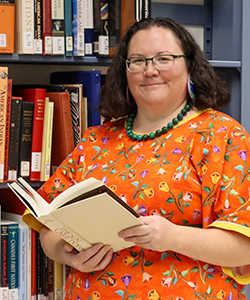
It started with a pumpkin.
In 2020, Aaron LaFromboise, director of library services at Blackfeet Community College’s (BCC) Medicine Spring Library (MSL), wanted to see if she could grow one on her own. Set in a large flowerpot, “that little pumpkin traveled back and forth to the library with me,” she says. “It would go home with me when we were on [COVID-19] lockdown.”
The traveling pumpkin never matured, LaFromboise recalls. But it planted the idea for MSL’s experimental garden. Since 2021, the passion project has been a teaching and learning opportunity for both staffers and locals.
“A library in one word is information, but it doesn’t have to be that traditional, passive book information,” LaFromboise says. “Our community does well with the oral, with the hands-on, and that’s how we’re going to pass on our information to the extent that we can.”
BCC is located in Browning, Montana, headquarters of the Blackfeet Reservation. LaFromboise, MSL’s sole librarian and past president of the American Indian Library Association, manages a small team of library technicians. After moving back to the reservation, she started as a technician at MSL in 2009 and went on to earn her MLIS. At the time, she had been struggling to decide on a career path—particularly one that could bring her back home to serve her community.
“I didn’t envision it being in this way, but this has been a lifelong goal of mine,” LaFromboise says. “I’m so proud and fulfilled to be doing it in the way that I am.”
MSL serves BCC’s 350 full-time students as well as the larger Blackfeet community. Because many tribal communities still have distrust of institutions, which LaFromboise connects to the longstanding racism and forced assimilation attempts through places like Native boarding schools, community programs are key to building local relationships. MSL’s programs range from computer courses for older adults to traditional, multigenerational beading classes.
It’s extremely important to know how to feed ourselves, [how] to gather what’s wild, and how to reiterate the importance of the ethical harvesting of wild plants.
Before starting the experimental garden, LaFromboise helped tend to BCC’s separate USDA extension garden during the pandemic, when the school was closed to nonemployees. The USDA later provided MSL with its own raised beds. With those, LaFromboise and her team have successfully grown a wide range of crops, including corn, beans, and tomatoes—and a pumpkin. They have planted fruit trees and bushes like local bullberry and sarvisberry. She has also turned an old playhouse into a makeshift greenhouse, used in part to cultivate plants for traditional teas.
To protect plants from the elements, LaFromboise has experimented with building natural windbreaks and weaving old willow branches into a fence-like structure, and she hopes to soon install a cover above the garden using plexiglass barriers acquired during the pandemic. She eventually wants to create a larger teaching garden on BCC’s campus.
The garden project has been a conversation starter with patrons, some of whom have mentioned building their own. It not only promotes food sovereignty, LaFromboise says, but it also enables locals to learn more about medicinal and traditional uses of local flora and fauna.
“In the world we live in,” she says, “it’s extremely important to know how to feed ourselves, [how] to gather what’s wild, and how to reiterate the importance of the ethical harvesting of wild plants.”
These efforts also fall into step with other recent, local projects related to sustainability and sovereignty. Blackfeet ranchers have adopted regenerative grazing practices, which improve soil health by closely managing where cattle forage. Earlier this year, Blackfeet Nation released a herd of buffalo to roam free on ancestral lands.
“It almost feels like an avalanche in our community,” LaFromboise says of these kinds of projects. “It keeps getting bigger the further along we go.”
Standing Up for Students
Martha Hickson: North Hunterdon High School in Annandale, New Jersey.
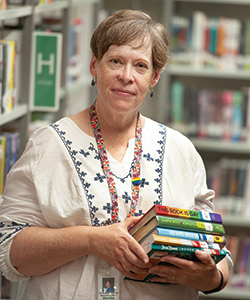
School librarians are often the only librarians at their institutions. Amid record-breaking rates of book challenges and bans, this also makes them the primary line of defense in local fights for intellectual freedom—and more susceptible to personal attacks.
“You just feel like you have all eyes on you,” says Martha Hickson, media specialist at North Hunterdon High School (NHHS) in Annandale, New Jersey. “You can’t make a move without someone criticizing it.”
In 2022, Hickson—now in her 19th year at NHHS—made national headlines after a months-long battle to stop the removal of five LGBTQ-themed books from her library: Lawn Boy by Jonathan Evison; Gender Queer by Maia Kobabe; Fun Home by Alison Bechdel; This Book Is Gay by Juno Dawson; and All Boys Aren’t Blue by George M. Johnson. When the challenges began in September 2021, Hickson was shocked to hear a parent at a North Hunterdon–Voorhees Board of Education meeting accuse her of grooming children and promoting pornography.
Right away, Hickson notified her union and groups like ALA’s Office for Intellectual Freedom and the National Coalition Against Censorship (NCAC). She also reactivated a network of community supporters that she built in 2015, when Fun Home was first challenged.
“It was very clear to me based on the books they were attacking, and the way they were attacking them, that the books were a proxy,” Hickson says. “They were really going after people, and people I care deeply about: my students.”
Throughout the fall and winter, she and allies wrote to school board members and showed up to their meetings. She also recruited local bestselling author David Levithan to send a statement of support. But the ongoing vitriol took a toll, Hickson says, and she had to leave work for more than a month following a stress-induced breakdown.
They were really going after people, and people I care deeply about: my students.
In January 2022, with Hickson watching via Zoom, the school board voted to retain all five books. “I started crying like a baby,” she says. “It was five months of stress and tension that just fell off my shoulders with a huge thud.”
Hickson received national and state awards for her efforts, including the 2022 Lemony Snicket Prize for Noble Librarians Faced with Adversity and NCAC’s Judith Krug Outstanding Librarian Award. “It’s very humbling,” Hickson says of the accolades. “Especially because … I am by no means the only person going through this.”
The battles at her school are not over, Hickson suspects, especially because one of the initial complainants won a spot on the school board last November. The tension of these events still lingers today, she says, and it’s not easy to stay motivated in the current local and national climate. But her drive comes from those who find respite and representation within her library’s walls.
“It makes me cry thinking about it—I’ve had kids pull me aside to say thank-you,” Hickson says. “I had one kid this past school year [say], ‘I’ve been watching you; I saw what you did, you’re a badass.’
“I’ve gotten dozens of emails, cards, letters from former students who watched this play out,” she continues. “Almost every one of those told me they were not out in high school, but they’re so thankful they had a library where they felt represented, and the representation and knowledge they had a safe space enabled them to come out in their own time.”
Saving a Community ‘Linchpin’
Vicki Selander: Castle Rock (Wash.) Public Library
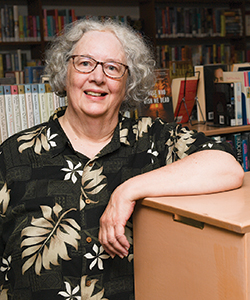
For the last 23 years, Vicki Selander has worked as director of Castle Rock (Wash.) Public Library (CRPL), serving the town of about 2,500 people in a former general store.
Most recently, she has kept CRPL afloat after residents began voting against funding the library in 2019. The last few elections have cut the library’s budget “to the bone,” she says. In its last budget prior to the 2019 vote, CRPL received $86,000 from the city; now it operates on $15,000 in city funds as well as additional donations, just enough to keep the lights on and doors open.
Selander started working at CRPL in 1995, taking a library assistant job after returning to her hometown following the death of her parents. She became director in 2000, while also holding down other part-time jobs, such as motel desk clerk and writing for her local newspaper. For most of her tenure, Castle Rock residents voted in favor of a tax levy to fund the library. Four years ago, however, voters shot down the levy twice. It hasn’t been approved in an election since.
“We’ve just barely failed each time,” Selander says. In August 2022, the measure fell short by just 25 votes.
“At first it was just terror and despair,” Selander remembers of her first reactions to losing the levy. She still isn’t sure what tipped voters in the other direction. It had happened before—voters had voted no in 2000 and 2008—but the votes swung back in the library’s favor in the following election cycles. That didn’t happen after the 2019 losses, with six levy attempts failing to reach the 60% supermajority needed to pass. The levy didn’t appear on the August primary election ballot this year, the first time it was missing since the library had been defunded. As of late September, the levy was not slated for the November election either.
I wouldn’t be putting myself through it if it didn’t mean a lot to me. I love this library and this little town, and I don’t want to see it lose it.
The city has since allocated just enough funding to pay CRPL’s utility bills. But beyond that, the library relies on both book and monetary donations to stay functional. The levy loss meant cutting library hours from 36 to 16 per week and doing away with both the part-time library assistant and janitor positions. Notably, Selander retired in 2020 to take her part-time salary and benefits off the city’s books. She continues to run CRPL, with the occasional help of other volunteers.
“There’s nobody to pass the torch to, especially for no pay,” she says, noting that retirement was her idea. “It’s worked to keep the library from dying.”
Selander and CRPL supporters continue to fundraise and advocate for the library’s value with hopes to secure more funding and eventually ramp up community programs.
“I wouldn’t be putting myself through it if it didn’t mean a lot to me,” Selander says. “I love this library and this little town, and I don’t want to see it lose it. We don’t have a community center or a youth center, so the library has been a linchpin.”
The Power of Programming
Chelsea Price: Meservey (Iowa) Public Library
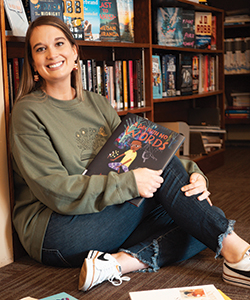
The town of Meservey, Iowa, covers 1.5 square miles. With a population of about 220, it doesn’t have a grocery store, school, or gas station. The closest movie theater is more than 11 miles away.
“The library serves as the only source of free entertainment in the area,” says Chelsea Price, director of Meservey Public Library (MPL). And for local families who can’t or don’t want to leave town, the library serves an important role.
Price has been MPL’s director since 2015, following in the footsteps of her mom, who was the library director in nearby Thornton, Iowa, and her grandmother, a school librarian. With Price and her library assistant on opposite schedules, she usually overses the library solo—a challenging task on only 20 hours a week, she notes.
“I’m not only the library director. I’m the children’s librarian, teen librarian. [I] do all the cleaning, the accounting, the marketing, social media, outreach, babysitting, IT,” Price says. “We are expected to do the same things that larger libraries do.”
MPL’s circulation numbers sharply declined during the COVID-19 pandemic and have not yet returned to prepandemic levels. While building attendance back up is slow-moving, programming has long been—and remains—MPL’s “bread and butter,” she says. “Our programming is more important right now than the materials we provide.”
Most of MPL’s events these days revolve around children and families, with programs like movie nights and animal visits in partnership with the local nature center averaging 20–30 kids. In the summer, the library hosts a carnival that attracts hundreds to the town.
The library serves as the only source of free entertainment in the area.
Price quite literally wrote the book on small library programs, publishing 209 Big Programming Ideas for Small Budgets (ALA Editions) in 2020. Her programming peak, she says, was in 2017, when she secured an appearance and book signing with bestselling author Elizabeth Berg simply by emailing her publicist and requesting a stop on Berg’s next book tour. Five minutes later, Berg’s team called Price, and plans were put in motion. The event brought in more than 80 people.
“I don’t think our library could have held more people,” she remembers. “That was something I didn’t even expect to get a response to.”
A lifelong resident of the area, Price says she does what she does because she wants “people to see small towns aren’t dying…. Small towns are still here.”
Though passionate, Price resists the vocational awe narrative that can often be associated with solo librarianship. The term, coined by library scholar Fobazi M. Ettarh, describes the belief that a profession traditionally viewed as a noble one, like librarianship, is beyond critique or improvement. It’s one that she says promotes the idea that library workers can single-handedly keep their communities thriving, which can lead to burnout.
“We didn’t sign up for that,” Price says. “We aren’t superheroes.… We’re just people—people who deserve good working conditions and a livable wage.”
Keeping a Community Healthy
Marilynn Lance-Robb: Georgetown County (S.C.) Library, Carvers Bay branch.

Marilynn Lance-Robb, a library manager and cosmetologist, has helped hundreds of patrons and salon clients improve their health literacy and information access.
Lance-Robb is the only full-time employee at Georgetown County (S.C.) Library’s (GCL) Carvers Bay branch. The branch—located in Hemingway, a town of about 450 people that is 50 miles from Myrtle Beach—serves both the western, rural areas of Georgetown County and part of adjacent Williamsburg County.
In 2006, the same year she became manager at Carvers Bay, she received a grant to put a computer in her hair salon, MaFlo’s (named after her mother, Florine), so clients could access reliable health information on their own through MedlinePlus, the National Library of Medicine’s (NLM) online information service. Lance-Robb consistently received funding for 15 years to provide educational resources and programming through both her salon and the library, including courses at the branch that taught patrons computer basics and how to find answers to health-related questions.
“Most of my clients were elderly, and they suffered from hypertension, heart disease, cancer, lupus, those types of things,” she recalls about what prompted her to start seeking funding. “When they’d come in, we’d have conversation about what’s ailing them or a health scare that’s going on. I’d always try and bring information to them.”
Amid the COVID-19 pandemic, Lance-Robb’s NLM funding went toward helping locals navigate their new normal. In addition to Zoom sessions detailing how to find information about the pandemic, she and her library team distributed fliers detailing when and where they could get vaccinated.
“People were very appreciative of it,” Lance-Robb says. “Even though some said they weren’t going to take the vaccine, when COVID started hitting close to home, it was a totally different story for most people.”
Though she hasn’t applied for an NLM grant since 2021, she continues to use the skills she has gained over the years to help those who come through the library’s doors. “Now, it’s incorporated as part of the job,” she explains.
These kinds of services are particularly important in communities like hers, Lance-Robb notes. “A lot of people in this rural area don’t have access to internet or Wi-Fi,” she says. “Some don’t have access to phones or computers that they can tap into this information.”
Lance-Robb started working for GCL in 1998 as a circulation clerk, a part-time gig while managing MaFlo’s. She still operates the salon part-time. Lance-Robb never expected to make a career out of library work. But serving her community is her passion, she says—something she’s able to do in both of her jobs.
“God put me on this road, and I’m just going to follow it,” she says.
A lot of people in this rural area don’t have access to internet or Wi-Fi. Some don’t have access to phones or computers that they can tap into this information.
Her work with NLM isn’t the only program Lance-Robb is proud of from her tenure with GCL. Each year, her branch hosts a day camp as part of its summer reading program, serving families who otherwise wouldn’t be able to afford similar programs, she says. From 2010 to 2018, she helped manage a bread ministry, collecting bread donations and bringing them to patrons and other community members in need. She still brings groceries from her local church’s food pantry to the library when possible.
“That’s what we do here,” Lance-Robb says. “We do our best to help those in our community who need a hand up.”
Source of Article